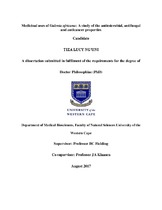Medicinal uses of Galenia africana: A study of the antimicrobial, antifungal and anticancer properties
Abstract
Over the years, microorganisms have become resistant to commonly used antimicrobial agents
leading to multidrug resistance. This is believed to occur even with new classes of therapeutic
agents thus creating a challenge on the global healthcare system. The study of medicinal plants
allows for their possible use as alternative therapeutic agents. Galenia africana (G. africana) is a
South African medicinal plant with numerous health benefits.
The purpose of this study was to evaluate the potential antimicrobial, antifungal and anticancer
properties of the ethanolic extract of G. africana. Prior to evaluating these properties, in vitro and
in vivo acute toxicity studies were conducted to assess the toxicity profile of G. africana.
The toxicity profile of the G. africana extract was evaluated using acute toxicity studies
conducted in animal and reconstituted human epidermis skin models. The results of the acute
oral and dermal toxicity studies revealed that the median lethal dosage (LD50) for G. africana
extract in Sprague-Dawley rats was considered to exceed 2000 mg/kg. In the dermal sensitization
study, the stimulation index (SI) values for the mice treated with the G. africana extract at
concentrations of 25% (50 mg/ml), 50% (100 mg/ml), and 100% (200 mg/ml), when compared
to the control group, were 1.3, 0.9 and 1.3, respectively which did not result in an SI value of ? 3
in any group. Hence, it did not elicit a hypersensitivity response. In the irritation test, the G.
africana (concentrate) and G. africana (in-use dilution) extracts were non-irritant on the
reconstituted human epidermis.

